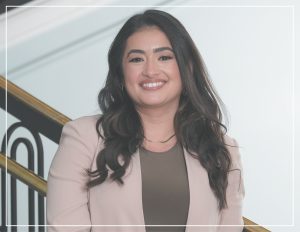Subscriber Benefit
As a subscriber you can listen to articles at work, in the car, or while you work out. Subscribe Now
Hensley Legal Group PC
University of Iowa College of Law, 2016
Why did you decide to enter the legal profession?
The history of law has always fascinated me. As a Catholic school kid, class lessons were intertwined with parables and the prevailing legal principles of their times. Central to these parables was a stark sense of “fairness.” As I got older, I could better discern the complexities of the law and inequalities in its enforcement.
If you hadn’t pursued a legal career, what would you be doing?
I truly enjoy working with people and problem-solving. My husband thinks I would have been a good therapist, and I was a psychology major prior to switching over to political science and pursuing law.
What is something you wish people knew about lawyers?
Lawyers are dedicated, but just like in any profession, we rely on continuous learning and collaboration to provide the best possible assistance.
Who is someone who has inspired you in your career?
My undergrad faculty adviser, who encouraged me to go to law school; several amazing prosecutors whose commitment to justice and relentless pursuit of fairness instilled in me a deep sense of purpose and responsibility; and my colleagues at Hensley, whose fearless advocacy continually pushes me to better my own abilities in the courtroom.
What’s the best advice you’ve ever received?
“Nobody cares [as much as you think they do]!” My Dad was trying to explain, in a way only a dad could, that people are more absorbed in their own thoughts and problems than in worrying about my bad hair day at Christmas mass. It helps me put things in perspective.
What makes a good lawyer/judge?
The ability to empathize and comprehend the perspectives of all parties involved is vital for a good judge. As a former prosecutor, I learned to appreciate the complex nature of legal proceedings and the necessity of seeing beyond black-and-white distinctions. Despite our roles as advocates, it was important to acknowledge systemic injustices and work to address them. A good lawyer or judge recognizes the weight of their responsibilities not just to their client but to all parties and the court, and they understand the nuances of the legal landscape and the need to approach each case with integrity and empathy.
Tell us about a “lesson learned” moment you’ve had in your career.
Perfection is the enemy of progress. Many attorneys suffer from having Type A personalities, myself included, and there have been instances where that need for perfection led me to paralysis, which in turn delayed progress on important cases. I try to approach my tasks with a mindset of generating excellent work while recognizing the importance of moving forward. Some good advice I received from a friend was to “do the next right thing”—which I still use to motivate myself to get out of that paralysis.
Tell us something surprising about you.
I served in the military for eight years and was a sergeant in the Iowa Army National Guard.
Please enable JavaScript to view this content.
